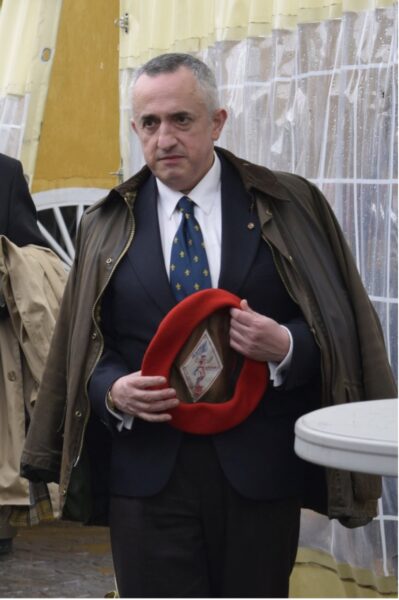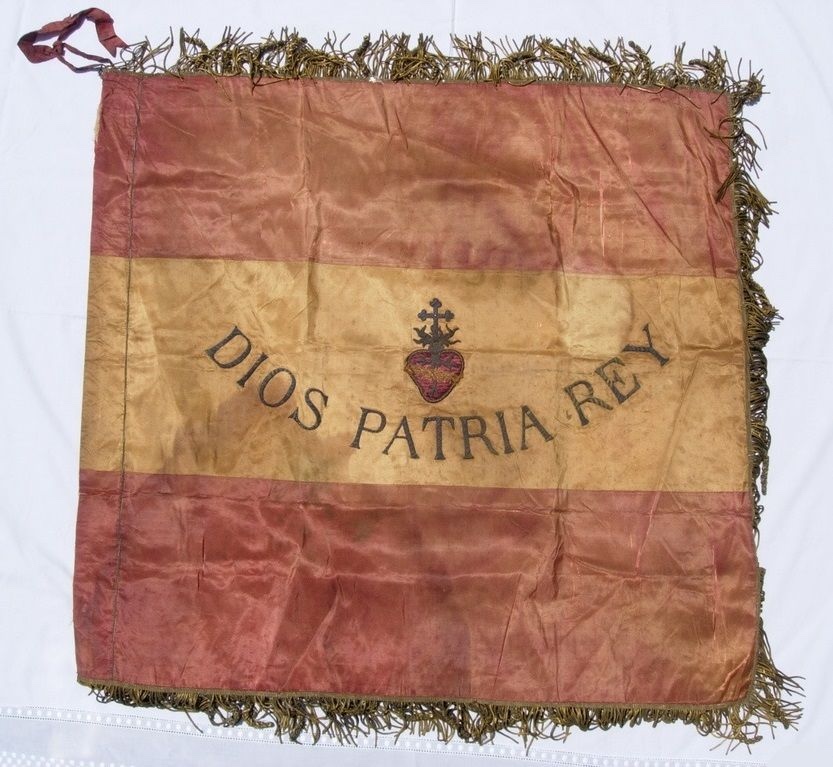|
Getting your Trinity Audio player ready...
|
Above: a Carlist banner with the Sacred Heart c. 1875.
In Memoriam of a Catholic Knight

Standing on the walls of Cartagena de Indias in Colombia as a warm breeze licked across the Caribbean Sea towards the city, two weeks after the death of Don Luis Infante on 9th April, the transferred Feast of the Annunciation, something my late friend had once said to me was made vividly real. It was across this horizon that a vast Protestant-Masonic British fleet had appeared in 1741 with the intent of capturing this strategically vital Spanish New World port, and, ultimately, strangulating Baroque Catholic Civilisation in Latin America.
The epic story of this all-out combined naval and land assault and the heroic and successful defence of the city by the Spanish, outnumbered nearly ten-to-one and led by the one-eyed, one-armed, and one-legged Admiral Blas de Lezo, was not one that I had heard recounted in the pantheon of Britannia’s naval engagements of the eighteenth century. We English know about Nelson and Drake, but we do not know about Blas de Lezo. Luis was full of such fascinating information. In telling me this story, he dramatically illustrated the continued vitality of Catholic Hispanidad as late as the era of the so-called ‘Enlightenment’ and how there was nothing foregone about the eventual triumph of Liberalism (as represented by the British) in modernity.
I first spoke to Don Luis after I approached my friend Don Miguel Ayuso in 2020 about conducting an interview on the oldest (and I would argue purest) counterrevolutionary political movement in the world: Carlism. He suggested that I speak to a member of the Carlist Political Secretariat – Mr Infante – since his English was highly fluent, having spent many years in the United States as an SSPX seminarian. The resulting interview stands as a testimony to his doctrinal clarity, erudition, and rhetorical crispness. I only regret that I did not organise another interview before his sudden death. There was so much more that remained to be asked.
We proceeded to communicate by email over the years that followed. Luis was always generous with the breadth and depth of his answers to my many questions and always transmitted, even digitally, a Latin warmth that is particularly attractive to us habitually-cooler and reserved Anglos. Luis was, in fact, a great Anglophile. He was an enthusiast for C.S. Lewis, G.K. Chesterton, J.R.R. Tolkien, and even Star Wars, seeing in them, I think, an essentially romantic spirit that resonates with those of us who have not forgotten the “Lost Causes” for Christian Civilisation, of which the Spanish Carlist cause Don Luis Infante, without exaggeration, dedicated his life.
Last year, I was asked to attend and report on the 2023 Pilgrimage of Nuestra Señora de la Cristiandad to Covadonga in Asturias, Spain for OnePeterFive. When Don Luis caught wind of my attendance, he was critical of my participation, seeing the Ecclesia Dei-oriented pilgrimage as compromised with liberal and Novus Ordo elements and too obeisant before hostile modernist clergy. Nevertheless, on returning to Oviedo, I arranged to meet with Luis for lunch on the Feast of St James. Despite his strong disapproval of the Covadonga pilgrimage edition that I had just walked, Luis was remarkably friendly and affable, a real gentleman. For Luis, it was perfectly natural to have a frank disagreement over the application of shared principles with somebody and yet embrace them as a fellow Catholic and friend. There is a lesson here.
That morning on an ambulant tour of Oviedo, he showed me the church where Francisco Franco was baptised and the fine headquarters of the Juan Vázquez de Mella Asturian Carlist circle where we imbibed some tobacco while putting the world to rights. Entering truly into the spirit of the national feast day, Luis then took me to a restaurant where he enthusiastically introduced me to Asturian cuisine. We set about dishes of thick bean stew, piquant oak-smoked blood sausage and gooey cachopo – two veal fillets sandwiched with cheese and ham – all washed down with the regional sidra. Luis was genuinely interested in all aspects of life and simultaneously full of stories; there didn’t seem to be many major figures in the traditional Catholic world that he hadn’t met.
Despite my protestations, Luis insisted on paying for our entire feast and driving me to the airport. He waited there with me for another two hours before my flight, all the while treating me to the most delightful conversation. A positive rather than wishful thinker, he was cultured, tough (he was a veteran of the elite Spanish Legion), and a bibliophile.
I will always remember how this mature Catholic knight treated this intellectually curious but rather unformed young man with the utmost generosity. He listened to my rather poor formulations with sincere interest and returned his much more valuable reflections, precision, and wisdom, not to mention humour. I do not begrudge him his doctrinal purity from which I learned so much. An unmarried layman who, like a knight of old, dedicated his life and work to the fight for the regime of Christianity, for the Kingdom of God as a political Kingdom, he defended what “Spain represents in history, which is nothing more than the survival of ancient Christianity.”
He was a true son of Santiago, of Spain, a Roman Catholic man, and a friend.
May he rest in peace.
The restoration of Christianity involves the restoration of pre-revolutionary political and social structures. And you don’t have to be afraid to say it. Yes, we are reactionaries; Yes, we want to go back to the past, what’s happening? Because precisely the past is the Counter-Revolution, the past is Christianity. That’s what we want to return to.
– Don Luis Infante


